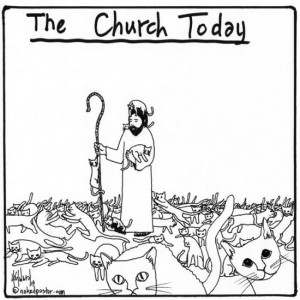From the Letter to the Hebrews:
Let us hold fast to the confession of our hope without wavering, for he who has promised is faithful. And let us consider how to provoke one another to love and good deeds, not neglecting to meet together, as is the habit of some, but encouraging one another, and all the more as you see the Day approaching.
(From the Daily Office Lectionary – Hebrews 10:23-25 (NRSV) – January 31, 2014.)
 Attendance is down. No one in the church really needs to be told this, although church ministry pundits have been making a good living for the last couple of decades reporting on it and diagnosing the reasons for it.
Attendance is down. No one in the church really needs to be told this, although church ministry pundits have been making a good living for the last couple of decades reporting on it and diagnosing the reasons for it.
A recent New York Times op-ed piece pointing it out (and repeating a lot of old complaints that supposedly explain it) has been reprinted and shared electronically a lot the past few weeks; I must have seen it posted on Facebook at least twenty times.
It’s not news, however. Over the past several years (for a few decades, in fact) attendance figures in all mainline churches have been falling. Some congregations have bucked the trend, but even they are beginning to notice that fewer people are filling the pews, chairs, couches, or whatever seating alternative is provided.
For a while, the various denominations looked inward for the problem. My own Episcopal Church went through a period of fairly rapid change starting in the 1970s — prayer book revision, ordination of women, acceptance of LGBT persons, ordination of LGBT persons — which erupted in internal conflict. Episcopal pundits pointed to each of these developments, or to the conflict that arose over them, or to the allegedly heretical theology behind them and blamed these interiorities for declining memberships and lower attendance.
Being of a fairly ecumenical bent, I read the press from other denominations. During the same period of time the other American mainline churches were experiencing the same sort of decline and — guess what? — their denominational press was laying the blame at the feet of whatever their particular conflict du jour might have been.
Then along came a secular sociologist, Robert Putnam, who pointed out that it was happening across the board . . . and not only among churches! Fraternal and public service organizations, social clubs, and even bowling leagues were all experiencing the same sort of decline. Putnam’s book Bowling Alone graphically demonstrates the congruence of membership growth-and-decline curves for all organizations that depend on and sustain what he calls “social capital.” Every church leader should read it!
Unfazed, the church growth-and-decline “experts” are at it again, this time laying the blame at the feet of age cohorts. The ecclesial blogosphere is rife with punditry blaming the Boomers, Gen-X, Gen-Y, or Millennials. And for every such essay there are a dozen or more answering pieces explaining why it isn’t “my generation’s” fault! It seems like everyone in the church is singing this old song by The Who from nearly 50 years ago:
People try to put us down
(Backbeat line: Talkin’ ’bout my generation)
Just because we get around
Things they do look awful cold
I hope I die before I get old
My generation
This is my generation, baby
Why don’t you all fade away
Don’t try to dig what we all say
I’m not trying to cause a big sensation
I’m just talkin’ ’bout my generation
My generation
This is my generation, baby
Why don’t you all fade away
And don’t try to dig what we all say
I’m not trying to cause a big sensation
I’m just talkin’ ’bout my generation
My generation
This is my generation, baby
My, my, my, my generation
My, my, my, my generation
People try to put us down
Just because we get around
Things they do look awful cold
Yeah, I hope I die before I get old
My generation
This is my generation, baby
My, my, my, my generation
My, my, my, my generation
Talkin’ ’bout my generation
(My generation)
Talkin’ ’bout my generation
(My generation)
Talkin’ ’bout my generation
(Is my generation baby)
Talkin’ ’bout my generation
(This is my generation)
Somehow, somewhere someone is going to knock this off! Active church people have to stop pointing the finger of blame and start working with one another on solutions. We’ve had enough punditry diagnosing (or misdiagnosing) the causes — now we need to work on reframing the Christian message for a new generation that hasn’t heard it. In the words of the writer of the Letter to the Hebrews we have to “meet together . . . encouraging one another.”
What “meet together” means in the 21st Century is another issue, however. With social media of all the various sorts, and newer versions developing nearly every day, and existing versions being tweaked and modified — Facebook seems to change hour by hour — it’s an on-going, and never-ending struggle to keep up and figure that out. But “meeting together” probably no longer means (as a colleague puts it) “butts in the pews.” “Average Sunday attendance” may have become a meaningless metric (if it ever was one).
There is value, of course, in face-to-face meeting, in getting to know one another as physical beings, in joining together in (what another colleague once called) “meat space;” for those of us for whom sharing the Bread and Wine of Holy Communion is of paramount importance, it’s imperative! But if that isn’t happening on Sunday morning, let’s accept that it isn’t, move on, and find new and different ways to be church, new and different ways to mark and follow the admonition in Hebrews. It’s time for the hand-wringing, finger-pointing, blame-calling, and excuse-making to end, and for creative solutions to begin. It’s time for us to meet together . . . somewhere, sometime . . . and encourage one another!
(The social media cartoon is by David Hayward aka Nakedpastor.)
====================
A request to my readers: I’m trying to build the readership of this blog and I’d very much appreciate your help in doing so. If you find something here that is of value, please share it with others. If you are on Facebook, “like” the posts on your page so others can see them. If you are following me on Twitter, please “retweet” the notices of these meditations. If you have a blog of your own, please include mine in your links (a favor I will gladly reciprocate). Many thanks!
====================
Father Funston is the rector of St. Paul’s Episcopal Church, Medina, Ohio.

 I have a hard time with the beheading thing . . . . I don’t know what it is, but there’s something about cutting someone’s head off that just appalls me.
I have a hard time with the beheading thing . . . . I don’t know what it is, but there’s something about cutting someone’s head off that just appalls me.  Seldom has depression been so artfully described as in these few lines of Hebrew poetry. Translated in the Prayer Book as “embittered,” the Hebrew is chamets which refers to yeast. It means “to be leavened” or “to be sour.” Most versions of the Scriptures translate it with some version of “bitterness,” a few use “grieved,” and the Complete Jewish Bible renders the verse, “when I had a sour attitude.” I rather like that last one, closest to the Hebrew, best; it describes depression perfectly.
Seldom has depression been so artfully described as in these few lines of Hebrew poetry. Translated in the Prayer Book as “embittered,” the Hebrew is chamets which refers to yeast. It means “to be leavened” or “to be sour.” Most versions of the Scriptures translate it with some version of “bitterness,” a few use “grieved,” and the Complete Jewish Bible renders the verse, “when I had a sour attitude.” I rather like that last one, closest to the Hebrew, best; it describes depression perfectly.
 Is it just me, or does this speech of Jesus (the verses are part of a long, long address to “the Jews”) just drip with frustration? And it makes me wonder – did Jesus really express such frustration? Or is it John who is frustrated and does his frustration color the way he presents the gospel story?
Is it just me, or does this speech of Jesus (the verses are part of a long, long address to “the Jews”) just drip with frustration? And it makes me wonder – did Jesus really express such frustration? Or is it John who is frustrated and does his frustration color the way he presents the gospel story? I’ve never quite understood the story of the tower of Babel. I get that it’s an etiological myth to explain the variety of languages spoken by human beings, but the picture of God that it paints is (shall we say?) less than positive. Might it have been better to cast someone else (say the Tempter?) as the “bad guy” who thwarts the plans of the tower builders?
I’ve never quite understood the story of the tower of Babel. I get that it’s an etiological myth to explain the variety of languages spoken by human beings, but the picture of God that it paints is (shall we say?) less than positive. Might it have been better to cast someone else (say the Tempter?) as the “bad guy” who thwarts the plans of the tower builders? I read those words and heard Bill Cosby’s voice. I’ll bet I’m not alone. More than 50 years ago (1963), Cosby’s debut comedy album Bill Cosby Is a Very Funny Fellow…Right! included a 3-1/2 minute skit he’d been doing on stage entitled Noah: Right! Ever since, it has colored the story of Noah and the ark for Americans; I know people who wouldn’t be born for another quarter century after that album’s release for whom Cosby’s skit is nonetheless an interpretive filter for the Noah story. Millions read the story and hear Noah asking, in Cosby’s voice, “Lord, what’s a cubit?”
I read those words and heard Bill Cosby’s voice. I’ll bet I’m not alone. More than 50 years ago (1963), Cosby’s debut comedy album Bill Cosby Is a Very Funny Fellow…Right! included a 3-1/2 minute skit he’d been doing on stage entitled Noah: Right! Ever since, it has colored the story of Noah and the ark for Americans; I know people who wouldn’t be born for another quarter century after that album’s release for whom Cosby’s skit is nonetheless an interpretive filter for the Noah story. Millions read the story and hear Noah asking, in Cosby’s voice, “Lord, what’s a cubit?” The musical Godspell debuted in 1971 (my junior year in college); in it, Christ is portrayed as a clown. Whether it was an expression of or the catalyst for the phenomenon of offering clown eucharists as an edgy, avant-garde presentation of the Christian Mysteries, I really don’t know. The two are inextricably linked in my memory.
The musical Godspell debuted in 1971 (my junior year in college); in it, Christ is portrayed as a clown. Whether it was an expression of or the catalyst for the phenomenon of offering clown eucharists as an edgy, avant-garde presentation of the Christian Mysteries, I really don’t know. The two are inextricably linked in my memory. Late yesterday I created and posted a “meme” on Facebook and then put it on this blog as well . . . a picture of a sack lunch with words from the early 1970s humor piece entitled The Deterioriata: “
Late yesterday I created and posted a “meme” on Facebook and then put it on this blog as well . . . a picture of a sack lunch with words from the early 1970s humor piece entitled The Deterioriata: “


